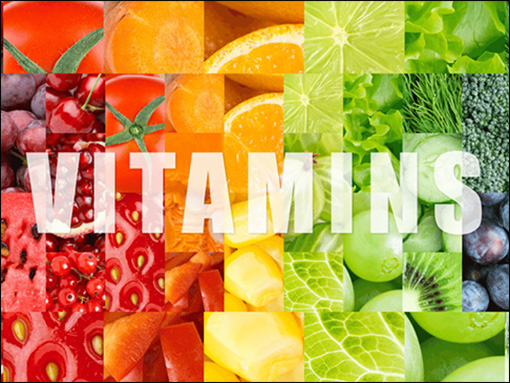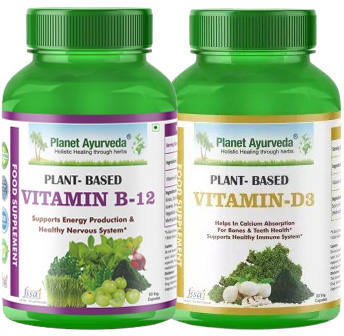Importance Of Vitamin B12 And Vitamin D3
Abstract
In today’s hectic environment, people frequently ignore their health, especially those who work full-time. As a result, there is a rise in lifestyle problems like vitamin deficiencies, which might be caused by poor diet and a lack of sunshine from prolonged indoor work hours. There are a number of short and long-term issues that might result from these deficiencies. According to a recent research that was published in the Indian Journal of Occupational and Environmental Medicine (IOJEM), almost 68% of the executives surveyed had vitamin B12 deficiencies, while over 28% had vitamin D deficiencies. A healthy existence may require more than the tasty things you eat every day. The appropriate dosage of supplements and vitamins that you take is essential for your overall health. Eating foods high in vitamin D3 and B12 can help protect you against a wide range of illnesses. So today we will read about the importance of Vitamin B12 and Vitamin D3 in this article in detail.

Introduction
Vitamin D3 (Cholecalciferol), often known as the sunshine vitamin, is a vitamin that dissolves in fat that belongs to the same family of components as vitamins D1 and D2. It is generated by the body naturally when exposed to sunlight as well as is in charge of ensuring that several vital minerals and nutrients, including calcium and phosphorus, are properly absorbed via the intestines. As a result, powerful bone health and muscular tone are ensured along with appropriate function of the immune system, endocrine system, along with heart health. However, vitamin B12, frequently referred to as cobalamin, is a water soluble vitamin, and one of the eight B vitamins. It is an essential component of every human cell’s metabolism. It is an essential cofactor for the DNA synthesis and the metabolism of amino and fatty acids.Because it contributes to the maturation of new red blood cells in the bone marrow, it is mostly necessary for the nervous system to function normally.
Sources Of Vitamin B12 And D3
Vitamins B12 and D3 are both present in similar foods.
Vitamin D3
Vitamin D3 is naturally abundant in foods sourced from the sea. These include fish liver oils and fatty fish flesh. For the same, tuna and salmon are excellent. Egg yolks, vitamin-fortified cereal, fortified orange juice and dairy products like milk, yoghurt,cheese, eggs all contain lesser quantities of this vitamin. Shiitake mushroom is rich in vitamin D3.
Vitamin B12
Food sources that naturally contain vitamin B12 include
- Fish such as salmon, tuna, trout, sardines, trout, shellfish
- Poultry and dairy products like eggs, cheese, milk, yoghurt
- Fortified meals, including some cereals
- Beef
Those who follow a purely vegetarian diet frequently have vitamin deficiencies and must give their bodies supplements because many of the foods that contain such vitamins are not vegetarian.
Benefits Of Vitamin D3
- Supports bone health – Phosphorus and calcium are necessary for healthy and strong bones, and vitamin D3 is necessary for their absorption and usage. Bone remodelling, a physiological process that includes the skeleton’s natural replacement of old bone tissues with newly formed bone tissues, and bone growth are both promoted by vitamin D.
- Enhance immune function – Immune health as well as illness prevention depend on vitamin D. Actually, several studies indicate that low levels of vitamin D may exacerbate or raise the frequency of some inflammatory diseases, like rheumatoid arthritis.
- Support weight management – Low levels of vitamin D may be linked to obesity, according to certain studies. Additionally, it is thought that vitamin D may affect body weight by controlling the development of fat cells, modifying the activity of specific genes, and influencing the amounts of hormones which stimulate appetite, like leptin.
- Regulates mood – The synthesis and control of neurotransmitters such as serotonin, that are essential to mood regulation, is regulated by vitamin D3. Sufficient amounts of vitamin D3 may contribute to better mood and psychological well being.
Benefits Of Vitamin B12
- Normal function of nervous system and brain
- Production of RBCs (Red blood cells) as well as prevention of anaemia
- Cognitive functioning
- Aiding in DNA synthesis and regulation
- Prevent from congenital defects
- Aiding in the prevention of macular degeneration in the eyes
- Essential to producing energy
Risk Factor That Could Result In Deficiency
Ageing, genetic susceptibility, persons of South Asian and South East race, inadequate food intake, mobility and lifestyle, and other health conditions are some major risk factors which result in deficiency amounts of vitamin D3 and B12.
Symptoms Of Deficiency Of Vitamin D3
- Hair loss
- Back and bone ache
- Bone loss and osteoporosis
- Muscle weakness
- Cramps or soreness
- Mood swings
- Unexplained and constant fatigue even after proper rest
- Poor healing of wounds
Symptoms Of Deficiency Of Vitamin B12
- Nausea
- Weakness
- Dizziness or lightheadedness
- Numbness or tingling
- Trouble walking
- Muscle weakness
- Irregular heart rate
- Vision loss
- Breathlessness
- Mental conditions like general irritability and depression
- Smooth tongue
- Pale skin
Toxicity Of Vitamin D3
The most common cause of vitamin D toxicity is supplementation. Although overexposure to sunlight does not result in toxicity because too much heat upon the skin stops D3 from generating, low levels of the vitamin contained in food are rarely to exceed a dangerous level. It is recommended that you avoid taking regular vitamin D supplements over 4,000 IU without your physician closely monitoring the situation.
Symptoms Of Toxicity
- Weight loss
- Anorexia
- Irregular heart beat
- Hardening of tissues and blood vessels brought on by elevated amounts of calcium in the blood, which may harm the kidneys and heart.
Side Effects Of Vitamin B12
Injections of hydroxocobalamin may have the following adverse effects
- Hot flashes
- Headaches
- Vomiting or nausea
- Dizziness
- Itching, pain, or swelling at injection site
Diagnose Of Vitamin D3 Deficiency
- 25-OH vitamin D test
Diagnose Of Vitamin B12 Deficiency
- Complete blood count (CBC)
- Serum B12 level
- Schillings test
- Reticulocyte count
- Folic acid
- Serum lactate dehydrogenase (LDH) level
- Urine test for Methylmalonic acid
- Homocysteine
Herbal Remedies For Vitamin D3 And B12 Deficiency By Planet Ayurveda
Planet Ayurveda is a huge manufacturing unit of various herbal medicines that is purely made from plant extracts. Every guideline from the ancient ayurvedic texts is strictly followed by the company. There are no chemicals, yeast, additives, binder, fillers, or preservatives in the medications. Every herbal medication is 100% pure vegetarian and has a GMP certification. Both the safety and lack of adverse effects make these medicines ideal for use. Planet ayurveda provides herbal remedies for deficiency of vitamin D3 and B12 which are mentioned below
- Vitamin – D3
- Vitamin – B12
1. Vitamin – D3
It is a polyherbal capsule containing mushrooms (Agaricus bisporus), chlorella (Seaweed), lichens, spirulina, etc. They naturally have high concentrations of vitamin D3, which helps to maintain healthy bones by regulating and absorbing calcium properly. Furthermore to these benefits, it also strengthens the body’s ability to fight disease and stimulates the immune system. It could also help avoid inflammatory diseases. It also acts as anti-depressants.
Dosage – 1 Capsule once a day before meal with lukewarm water.
2. Vitamin – B12
It is a polyherbal capsule containing barley grass, moringa leaves, green amla, wheat grass, stevia Leaves, beetroot, etc. They are beneficial for enhancing cognitive function, maintaining the health of the eyes, and boosting the body’s metabolism as they are rich sources of vitamin B12. Also, vitamin B12 lowers the risk of immunodeficiency illnesses and improves haemoglobin.
Dosage – 1 Capsule once a day before meal with lukewarm water.
Conclusion
In this article we read about the importance of vitamin B12 and D3. Vitamin D facilitates the absorption of phosphate and calcium from diet. It is critical for immune system performance, bone and muscular strength, and may offer additional advantages including reducing the risk of inflammatory diseases. Vitamin D3 is more effectively used by the body as compared to vitamin D2. Diet and supplements both contain vitamin D, and exposure to sunlight causes the body to produce D3. Vitamin B12 is necessary for the body to make red blood cells, support healthy brain and neurological system function, and carry out other essential functions. Animal products are the primary source of the vital vitamin B12. 2.4 mcg per day is needed by most individuals. Certain individuals, including older people and those with poor vitamin absorption, are especially vulnerable to deficiencies. Due to the lack of B12 in their diet, vegans may potentially be at risk for deficiencies.




